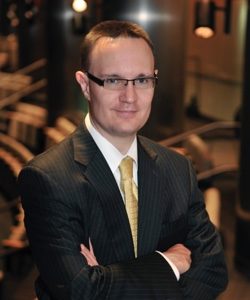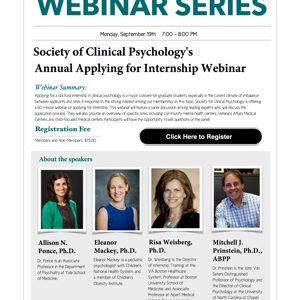Family Involvement in Treatment for Psychiatric Disorders: The Why and the How (With CE)
$50.00
Presenter: Lauren M. Sippel, Ph.D.
Overview:
Individuals are embedded within social networks—most immediately within families and intimate relationships. These relationships are central to quality of life, well-being, and physical health (Holt-Lunstad et al., 2018, 2022). Yet, psychiatry and psychology typically operate at the level of the individual, in terms of how we think about the development and maintenance of psychiatric disorders and of course how we treat them—with individual psychotherapy and pharmacotherapy. There has been increasing national attention to poor social connection and loneliness as public health crises (e.g., Murthy et al., 2023) and recognition of the important role that relationships play in recovery from psychiatric illness (e.g., Liebman et al., 2022). In this presentation, Dr. Sippel will present the rationale for involving family members in mental health treatment and in which ways, the current evidence base for involving families in treatment for conditions including depression, posttraumatic stress disorder, substance use, schizophrenia, and bipolar disorder (Barbato et al., 2018; Sijercic et al., 2022), limitations of this literature with proposals for future directions (Reuman et al. 2022), and recommendations for assessment and clinical practice.
Bio:
Dr. Sippel is a licensed clinical psychologist, an Assistant Professor of Psychiatry at the Geisel School of Medicine at Dartmouth, and an Associate Director at the Department of Veterans Affairs Northeast Program Evaluation Center. Dr. Sippel’s research program involves (1) evaluating the effectiveness of mental health interventions for improving psychiatric symptoms and psychosocial functioning, (2) examining cognitive, affective, and neurobiological mechanisms of trauma recovery and interpersonal problems experienced by trauma-exposed individuals and (3) developing novel treatments that target these shared mechanisms in an effort to improve interpersonal functioning. Dr. Sippel has been conducting research on PTSD and relationships for over 10 years. She currently has funding from the Department of Veterans Affairs to augment brief couple therapy for PTSD with the neuroheuromone intranasal oxytocin. She is also certified in delivery of Cognitive Behavioral Conjoint Therapy for PTSD. Her work in VA involves national monitoring and evaluation of team-based care in general mental health and provision of implementation support toward evidence-based practices.
Learning Objectives: Intended Audience: Intermediate
- describe the reasons why involving family in mental health care can be helpful for patients
- compare strength of research evidence for family-involved care for various psychiatric conditions
- apply recommendations for assessment and treatment to clinical practice
CE Credits Available: 1.0
Attendees must attend the entirety of the program and complete the Evaluation sent after the program. Evaluations will be sent via email shortly after the Live webinar. CE Certificates will be processed and emailed within 5 – 10 business days from Live Webinar.
Cost: Free for Members and $50 for Non-Members (NOTE: Members must be signed in to get the discounted rate. If you have trouble signing in, contact us).
PLEASE NOTE: You must sign in to receive the Member discount. After purchasing, you must follow the link in your receipt provided to REGISTER for the webinar via Zoom. It is a 2-step process. If a link does not appear, contact us.
Cancellation Policy: No refunds will be provided except when SCP cancels the webinar.
The Society of Clinical Psychology, Division 12 nor Dr. Sippel have commercial support for the content of this webinar including endorsement of products, conflict of interest including but not limited to research grants, royalties for books or training, commercial support from companies or pharmaceutical sponsorship.
If you require any special needs assistance, please contact the SCP Central Office at [email protected].
“Society of Clinical Psychology, Division 12 of APA is approved by the American Psychological Association to sponsor continuing education for psychologists. Society of Clinical Psychology, Division 12 of APA maintains responsibility for this program and its content.”
Description
Presenter: Lauren M. Sippel, Ph.D.
Overview:
Individuals are embedded within social networks—most immediately within families and intimate relationships. These relationships are central to quality of life, well-being, and physical health (Holt-Lunstad et al., 2018, 2022). Yet, psychiatry and psychology typically operate at the level of the individual, in terms of how we think about the development and maintenance of psychiatric disorders and of course how we treat them—with individual psychotherapy and pharmacotherapy. There has been increasing national attention to poor social connection and loneliness as public health crises (e.g., Murthy et al., 2023) and recognition of the important role that relationships play in recovery from psychiatric illness (e.g., Liebman et al., 2022). In this presentation, Dr. Sippel will present the rationale for involving family members in mental health treatment and in which ways, the current evidence base for involving families in treatment for conditions including depression, posttraumatic stress disorder, substance use, schizophrenia, and bipolar disorder (Barbato et al., 2018; Sijercic et al., 2022), limitations of this literature with proposals for future directions (Reuman et al. 2022), and recommendations for assessment and clinical practice.
Bio:
Dr. Sippel is a licensed clinical psychologist, an Assistant Professor of Psychiatry at the Geisel School of Medicine at Dartmouth, and an Associate Director at the Department of Veterans Affairs Northeast Program Evaluation Center. Dr. Sippel’s research program involves (1) evaluating the effectiveness of mental health interventions for improving psychiatric symptoms and psychosocial functioning, (2) examining cognitive, affective, and neurobiological mechanisms of trauma recovery and interpersonal problems experienced by trauma-exposed individuals and (3) developing novel treatments that target these shared mechanisms in an effort to improve interpersonal functioning. Dr. Sippel has been conducting research on PTSD and relationships for over 10 years. She currently has funding from the Department of Veterans Affairs to augment brief couple therapy for PTSD with the neuroheuromone intranasal oxytocin. She is also certified in delivery of Cognitive Behavioral Conjoint Therapy for PTSD. Her work in VA involves national monitoring and evaluation of team-based care in general mental health and provision of implementation support toward evidence-based practices.
Learning Objectives: Intended Audience: Intermediate
- describe the reasons why involving family in mental health care can be helpful for patients
- compare strength of research evidence for family-involved care for various psychiatric conditions
- apply recommendations for assessment and treatment to clinical practice
CE Credits Available: 1.0
Attendees must attend the entirety of the program and complete the Evaluation sent after the program. Evaluations will be sent via email shortly after the Live webinar. CE Certificates will be processed and emailed within 5 – 10 business days from Live Webinar.
Cost: Free for Members and $50 for Non-Members (NOTE: Members must be signed in to get the discounted rate. If you have trouble signing in, contact us).
PLEASE NOTE: You must sign in to receive the Member discount. After purchasing, you must follow the link in your receipt provided to REGISTER for the webinar via Zoom. It is a 2-step process. If a link does not appear, contact us.
Cancellation Policy: No refunds will be provided except when SCP cancels the webinar.
The Society of Clinical Psychology, Division 12 nor Dr. Sippel have commercial support for the content of this webinar including endorsement of products, conflict of interest including but not limited to research grants, royalties for books or training, commercial support from companies or pharmaceutical sponsorship.
If you require any special needs assistance, please contact the SCP Central Office at [email protected].
“Society of Clinical Psychology, Division 12 of APA is approved by the American Psychological Association to sponsor continuing education for psychologists. Society of Clinical Psychology, Division 12 of APA maintains responsibility for this program and its content.”






Reviews
There are no reviews yet.